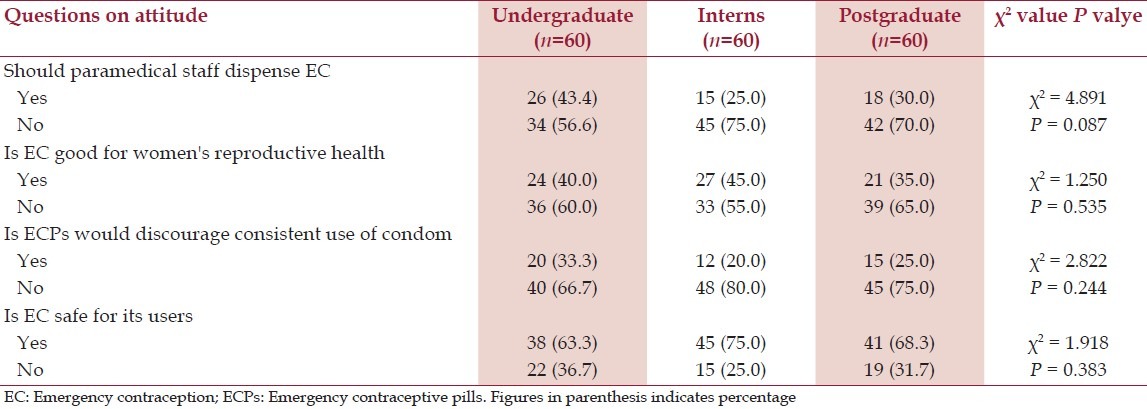Dear Editor,
I went through an article entitled “Knowledge and attitude of medical undergraduate, interns and postgraduate students in India towards emergency contraception”, published recently in the North American Journal of Medical Sciences.[1] The article derives its strength from the fact that ultimately, it is this study population which has a role to play in emergency contraception. KAP comprises of three components-knowledge, attitude, and practice. These types of studies are a good way to assess health care delivery. KAP studies are easy to conduct, measurable, and easily interpretable. This makes these studies a useful survey methodology. Most of the KAP studies lack in measuring attitude properly (the second part of a standard KAP survey questionnaire).[2] It is here that this study suffers too. Attitudes are acquired characteristics of an individual. Attitude includes three components: (a) A cognitive or knowledge element (b) an affective or feeling element, and (c) a tendency to action.[3] Attitude has been defined as a relatively enduring organization of beliefs around an object, subject, or concept which predisposes one to respond in some preferential manner. The authors have done a nice work while dealing with the feeling element of the attitude, but have handled “tendency to action” inadequately. The focus in attitude evaluation has to be the study participant and not someone else. In question number one of the attitude component [Table 1], the focus is on paramedical staff. The other three questions really focus on knowledge, and not on attitude.[1] The attitude part could have been constructed as follows:
Table 1.
Participant's attitude about emergency contraception

A patient seeks consultation after unprotected sex. The target attitude for health care professionals in this situation should be providing emergency contraception. The scale should read as:

Scoring
Recode the items that have negatively worded endpoints on the right, so that higher numbers then always reflect a positive attitude to the target behavior (e.g., for ′pleasant-unpleasant′, an answer of 6 becomes score of 2; a score of 4 remains a 4.
References
- 1.Giri PA, Bangal VB, Phalke DB. Knowledge and attitude of medical undergraduate, interns and postgraduate students in India towards emergency contraception. N Am J Med Sci. 2013;5:37–40. doi: 10.4103/1947-2714.106193. [DOI] [PMC free article] [PubMed] [Google Scholar]
- 2.Launiala A. How much can a KAP survey tell us about people›s knowledge, attitudes and practices? Some observations from medical anthropology research on malaria in pregnancy in Malawi. Anthropol Matters. 2009:11. [Google Scholar]
- 3.Park K. Park′s Textbook of Preventive and Social Medicine. 21st ed. Jabalpur: M/s Banarsidas Bhanot; 2011. Medicine and Social Sciences; p. 626. [Google Scholar]


